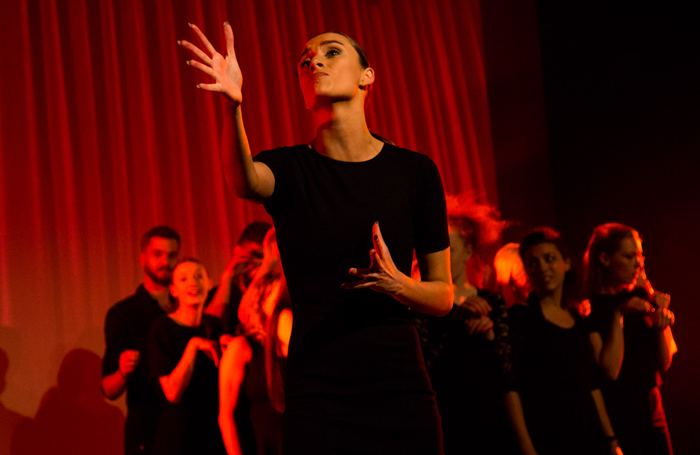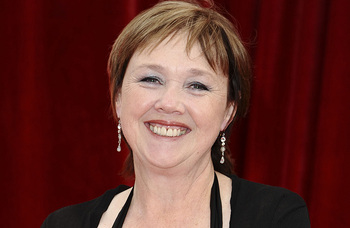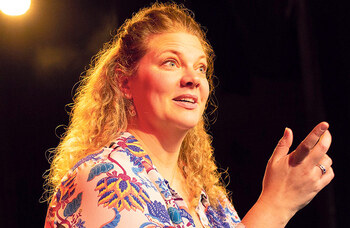Institute for Contemporary Theatre: new name, new course, new horizons
Formerly known as the Brighton Institute for Contemporary Theatre Training, (BRICTT) the organisation has developed contemporary training for young performers, encompassing hip hop and sign language with an entrepreneurial spirit
With a new name, a new approach to training, a unique new course and a new northern base to complement its south-coast home, the Brighton Institute for Contemporary Theatre Training has grown in ambition, reach and success since it was launched in 2017.
Newly rebranded as the Institute for Contemporary Theatre (ICTheatre), a raft of new initiatives and offerings – not least the announcement of a second home in Manchester from 2020 – underlines its position as one of the most innovative and forward-looking destinations for students keen to be trained to meet the ever-changing needs of a buoyant and bold performing industry.
Evidence of such is found in the institute’s core three-year BA (hons) degree in Performing Arts, newly redesigned following extensive discussions with the professional industry, says founder and creative director Mia Bird.
“With three different pathways for students, the degree is much more diverse, much more accessible to all kinds of talents and much more contemporary in focus. Where it hasn’t changed is the way it combines educational attainment with contemporary industry needs and opportunities. In a nutshell, it’s about getting the trained professional into work.”

Much has changed for young performers in recent years, adds Bird, who is an experienced West End performer and songwriter with an extensive background in education, and these changes are reflected in the degree’s new emphasis on contemporary styles and techniques. She says: “It’s no longer enough to be a ‘triple threat’ performer. Now, you have to be able to devise and create work, to know how to market yourself and to be your own business.”
She adds: “As opportunities become broader by the day – in immersive and site-specific theatre, in new physical environments and video games, on YouTube and social media, performers have to be much more multifaceted and self-starting.”
That recognition underpins the new dynamic thrust of a degree that offers three clear routes for students to develop as artists: a broad-based contemporary approach to Musical Theatre in all its various guises and outlets, an Acting for the 21st Century strand geared towards producing the performers of tomorrow on stage and screen and, uniquely, training in Hip Hop Artistry.
“Each route is designed to provide a physical element, a performance element, an entrepreneurial and business element and a vocal element,”says Bird. “All three have the same structure but students in each major discipline will be introduced to the basic skills drawn from the others that they will need to be fully rounded performers in an increasingly competitive marketplace.”
The first of its kind anywhere in the UK, the hip-hop course highlights the institute’s cutting-edge credentials. Patron and globally recognised DJ and hip hop pioneer Ron Elliston sees the institute taking the lead in vocational training for a form raised to new theatrical prominence by the emergence of hip-hop theatre and the phenomenal worldwide success of Lin-Manuel Miranda’s Hamilton, soon to reach the end of its second year at London’s Victoria Palace Theatre in December.
“It’s a form that has cut through from cult to centre stage and, until now, there’s been nowhere for students to explore the elements of hip hop culture and artistry that have been globally embraced in modern theatre music and dance.”
A similarly modern sensibility informs both the Musical Theatre course, where students will be introduced to the puppetry and circus skills popularised by the success of Avenue Q and Cirque du Soleil. There, and in the core acting course, there’s also a focus on television and film techniques, and on a shared emphasis on creating work through devised approaches to performance alongside conventional scripted material.

Taking its cue from ICTheatre’s wider ethos towards accommodation and inclusivity, there are also classes in acting with sign language. Typically for the young school, it taps into an initiative coming slowly but surely to the fore of an industry striving to be more accessible.
“There’s a move, spearheaded by Birmingham Rep (whom we’ve been talking to) of integrating signing into performances rather than having a ‘signer’ at the side of the stage. At the moment, not many performers out there can act and sign at the same time. To have that skill in the years ahead will give our graduates a huge advantage.”
All of which contributes to a degree course that offers students the best of both worlds: the flexibility of a higher-education institution and the dedicated vocational focus of a conservatoire. In return, the institute is looking for students who are, in Bird’s words, “passionate, creative and willing to take risks in order to discover who they are as people and performers.”
She adds: “We know we ask a lot of performers, but it’s because that’s what the industry will do when they graduate. But we also know that students need to be supported emotionally and mentally, and all our courses include sessions in mindfulness and mental resilience precisely because all our teaching staff – drawn from top industry professionals – have personal experience of what it takes to succeed in a highly competitive market.”
With class sizes limited to between 15 and 20 students, full-time training each week and students having access to a dedicated tutor drawn from industry professionals, many of whom still work in the West End and wider afield, the institute’s distinctive courses can rightfully claim to be “designed by the industry for the industry”.
Partnerships in Brighton with the Screen and Film School (formerly Brighton Film School) and BIMM Institute and, from next year, in Manchester with the Screen and Film School, places the institute squarely at the centre of productive, creative hubs. It also gives students vital access to state-of-the-art facilities to hone their skills in front of the camera, in acting for video games, self-taping audition techniques and a host of other skills.
Courses on both sites will be aligned, offering students the opportunity to spend a year in Manchester and transfer to Brighton (and vice versa).
“If it was ever true that London was the only place to be for young performers, it’s certainly no longer the case. Our experience has shown us that the demand for student places outside the capital is huge and delivers considerable cost-saving advantages.”
For the first time in 2019, ICTheatre students are now eligible to apply for a loan for the full cost of the course through government-sponsored loan arrangements, which means the Institute for Contemporary Theatre has never been more accessible or affordable.
With its unrivalled industry connections, in-house agency and fresh, modern approach to learning, it is fast becoming a first-choice destination for today’s students wanting to be tomorrow’s performers.
Most Read
Across The Stage this weekYour subscription helps ensure our journalism can continue
Invest in The Stage today with a subscription starting at just £5.99





